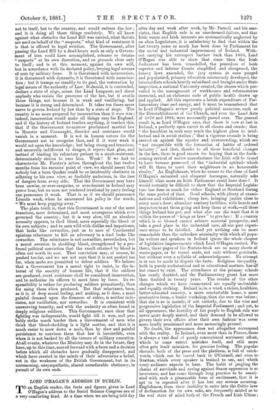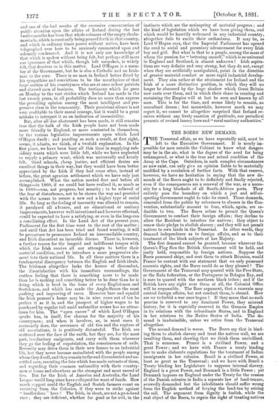LORD O'HAGAN'S ADDRESS IN DUBLIN.
ry10 an English reader, the facts and figures given in Lord O'Hagan's address to the Social Science Congress are of a very comforting kind. At a time when we are being told day after day and week after week, by Mr. Parnell and his asso- ciates, that English rule is an unredeemed failure, and that Irish wants and Irish interests are systematically neglected by an alien Legislature, it is satisfactory to find that within the last twenty years so much has been done by Parliament for the social and industrial improvement of Ireland. With- out carrying his retrospect further back than 1860, Lord O'Hagan was able to show that since then the Irish Judicature has been remodelled, the procedure of both superior and inferior Courts simplified and cheapened, the lunacy laws amended, the jury system at once purged and popularised, primary education enormously developed, the intermediate schools heavily subsidised and brought under State inspection, a national University created, the abuses which pre- vailed in the management of workhouses and reformatories corrected, and an elaborate code of public health drawn up and applied. All this represents a lavish expenditure of Par- liamentary time and energy, and it must be remembered that in Lord O'Hagan's review purely political measures, such as the Disestablishment of the Church, and even the Land Acts of 1870 and 1881, were necessarily passed over. The general result is, as Lord O'Hagan says, that there is now at last in Ireland, a perfectly open career to all classes and creeds ; that the humblest in rank may reach the highest place in intel- lectual and in social station ;" that a vigorous crusade is being carried on against the squalor and overcrowding, which are "not compatible with the formation of habits of ordered industry ;" and that, thanks to all these beneficial changes in the law, there is good reason for hoping that in the forth- coming revival of native manufactures the Irish will be found to have become possessed of the industrial aptitude which will fit them to meet their neighbours in an honourable rivalry." An Englishman, when he comes to the close of Lord O'Hagan's animated and eloquent harangue, naturally asks himself what more an Irish Parliament could have done ? It would certainly be difficult to show that the Imperial Legisla- ture has done so much for either England or Scotland during the same period of time. Good schools, with plenty of exami- nations and exhibitions ; cheap law, bringing justice close to every man's door ; abundant sanitary facilities, with boards and inspectors to set them going and keep them at work,—all these things Ireland has got, and what else can she want that it is within the power of kings or laws" to give her ? If a country which is so blessed cannot achieve material prosperity, and take a good place in the industrial race, all our past experi- ence seems to be falsified. And yet nothing can be more remarkable than the unbroken unanimity with which all popu- lar writers and speakers in Ireland ignore the whole chapter of legislative improvements which Lord O'Hagan recited. For them, these pages of the Statute-book are so many sheets of waste-paper, to be tossed aside, not only without gratitude, but without even a syllable of acknowledgment. No attempt is or can be made to dispute the facts. Religious inequality, both in purely ecclesiastical and in educational matters, has all but ceased to exist. The attendance at the primary schools has nearly doubled, and the Parliamentary grant has more than doubled in twenty years. The results of the other changes which we have enumerated are equally undeniable and equally striking. Ireland is, in a word, a richer, healthier, better-educated country, a more comfortable home, a more productive farm, a busier workshop, than she ever was before ; that she is so is mainly, if not entirely, due to the wise and progressive legislation of the Imperial Parliament ; and yet, to all appearance, the hostility of her people to English rule was never more deeply seated, and their demand to be allowed to govern their own affairs after their own fashion• was never more loudly proclaimed and more menacingly pressed.
No doubt, the appearance does not altogether correspond with the reality. In Ireland, even more than in France, there is always a vast deal of purely conventional sentiment afloat, which to some extent mistakes itself, and still more often gets itself mistaken, for genuine feeling. The popular rhetoric, both of the press and the platform, is full of catch- words, which can be traced back to O'Connell, and even to Grattan, which every speaker is trained to use, and which every audience expects to hear. The habit of jangling the chains of servitude and raving against Saxon oppression is so inveterate, and has come through long practice to be associ- ated with such a pleasurable form of excitement, that it is apt to be repeated after it has lost any serious meaning. Englishmen, from their inability to enter into the Celtic love of declamation for its own sake, are frequently misled as to the real state of mind both of the French and Irish Ultras ; and one of the bad results of the excessive concentration of public attention upon the affairs of Ireland during the last twelve months has been that whole columns of the empty rhodo- montade, which is constantly being poured forth in that country, and which in ordinary times passes without notice, have been telegraphed over here to be anxiously commented upon and solemnly condemned. And it is not only our knowledge of that which is spoken without being felt, but perhaps still more vur ignorance of that which, though left unspoken, is widely felt, that deceives us in this matter. Lord O'Hagan is a mem- ber of the Government, but he is also a Catholic and an Irish- man to the core. There is no man in Ireland better fitted by his sympathies and convictions to be the mouthpiece of that large section of his countrymen who are at once ardent patriots and shrewd men of business. The testimony which he gave on Monday to the vast strides which Ireland has made in the last twenty years, in all probability does no more than express the prevailing opinion among the most intelligent and pro- gressive class in the community. Their persistent silence is not very creditable to their moral courage, but it would be a great mistake to interpret it as an indication of insensibility.
But, after all due abatement has been made, it still remains true that the bulk of the Irish people have not been made • more friendly to England, or more contented in themselves, by the various legislative improvements upon which Lord 'ffliagan dwelt ; and puzzling as such a result, at first sight, seems, it admits, we think, of a twofold explanation. In the first place, we have been busy all this time in supplying sub- sidiary wants which were little felt, while we have neglected to supply a primary want, which was universally and keenly felt. Good schools, cheap justice, and efficient drains are excellent things in their way, but they would have been better appreciated by the Irish if they had come after, instead of before, the great agrarian settlement which we have only just accomplished. What the nation needed first and before all things—in 1860, if we could but have realised it, as much as in 1880—was, not progress, but security ; to be relieved of the fear of disturbance, not to be shown the way and provided with the means to secure a new and a higher type of social life. So long as the feeling of insecurity was allowed to remain, it paralysed all aivance, and no educational or sanitary improvements, however well-intentioned and however effectual, could be expected to have a satisfying, or even in the long-run a conciliating effect. In the Land Act of the present year, Parliament for the first time went to the root of the matter ; and until that Act has been tried and found wanting, it will be premature to pronounce Ireland an irreconcilable country, and Irish discontent an incurable disease. There is, however, a further reason for the languid and indifferent temper with which the Irish receive all our attempts to better their material condition, and to introduce a more progressive ele- ment into their national life. In all these matters there is a fundamental discrepancy between the English and Irish ideals. The Irishman altogether lacks the horror of discomfort, • the dissatisfaction with his immediate surroundings, the restless feeling that there is something more to be made than he is making and something better to be done than he is doing, which is bred in the bone of every Englishman and Scotchmen, and which has made the Anglo-Saxon the most • pushing and improving of races. However bare and squalid the Irish peasant's home may be, in nine cases out of ten he prefers it as it is, and the prospect of higher wages to be purchased by regular toil amid unfamiliar scenes has no attrac- tions for him. The "open career" of which Lord O'Hagan speaks has, in itself, few charms for the majority of his countrymen ; and when it involves, as, in most cases it necessarily does, the severance of old ties and the rupture of old associations, it is positively distasteful. The Irish are scattered over the face of the earth, but they are, for the most part, involuntary emigrants, and carry with them wherever they go the feeling of expatriation, the consciousness of exile. Necessity may drive them in their new homes to an industrial life, but they never become assimilated with the people among 'whom they dwell, and they remain to the end discontented and un- settled men, resenting the fate which has made outcasts of them, and regarding their common nationality with their country- men at home and elsewhere as the strongest and most sacred of ties. But for the Irish of America and Australia, the Land League would long since have collapsed for want of funds. How much support could the English and Scotch farmers count on receiving from the Colonies, if they were to strike against " landlordism " here ? The Irish, irr short, are not a go-a-head race ; they are deficient, whether for good or for evil, in the instincts which are the mainspring of material progress ; and the kind of legislation which we have been giving them, and which would be heartily welcomed in any industrial country, altogether fails to excite their enthusiasm. It may be, as Lord O'Hagan says, that the Imperial Parliament has opened the road to social and pecuniary advancement for every Irish boy and girl. But what is that to a people, among the mass of whom the passion for "bettering oneself," which is so universal in England and Scotland, is almost unknown ? Irish aspira- tions are very definite and very strong, but they do not, except when they are artificially manipulated, point in the direction of greater material comfort or more rapid industrial develop- ment. They aim rather at the attainment for Ireland and the Irish of a, more distinctive position, in which they will no longer be obscured by the huge shadow which Great Britain now casts over them, and in which their share in creating and sustaining the Empire will at last be seen and known by all men. This is for the time, and seems likely to remain, an unrealised dream ; but meanwhile, however much we may regret it, we cannot be altogether surprised that Ireland re- ceives without any lively emotion of gratitude, our periodical presents of revised lunacy laws and "rural sanitary authorities."































 Previous page
Previous page